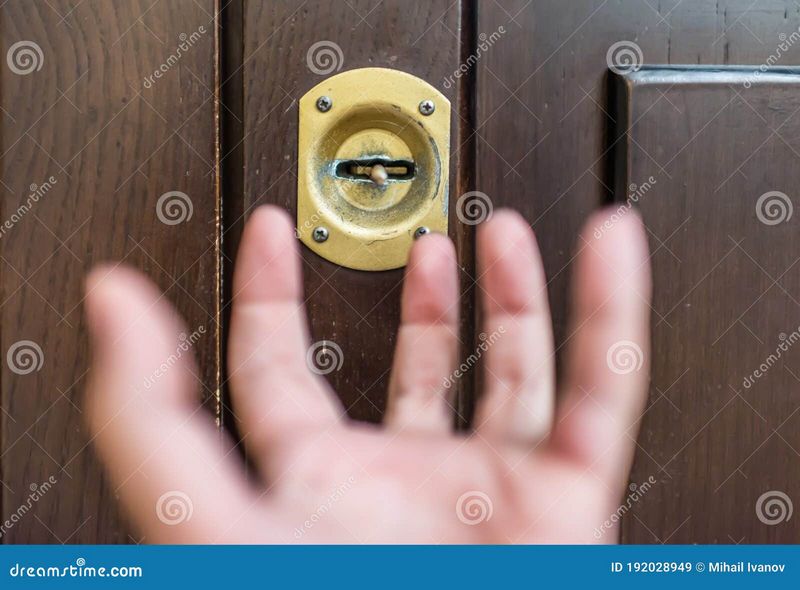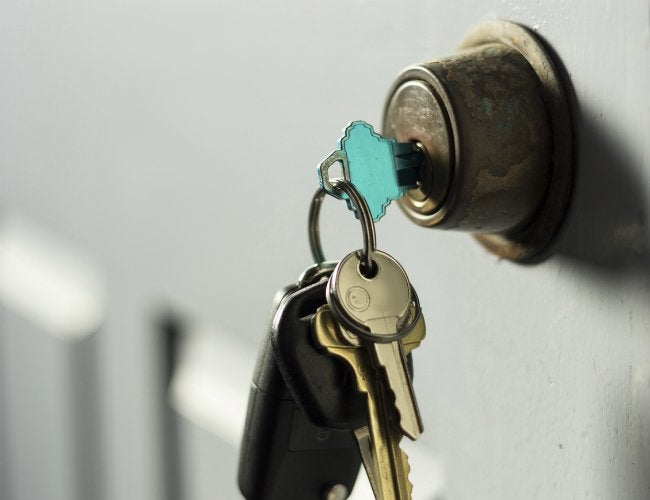
Key Stuck in Lock – What To Do & How Much it Will Cost
If you’ve ever found yourself in a situation where your key is stuck in a lock, you know how frustrating it can be. Not only can it prevent you from accessing your belongings, but it can also be a security risk. So, what should you do? Well, the first thing is to stay calm and try not to force the key out. This can cause damage to both the lock and the key, making the situation even worse. Instead, try using some graphite lubricant or some WD-40 to loosen the key and gently try to remove it. If that doesn’t work, it’s time to call a professional locksmith. They have the tools and expertise to safely remove the key without causing any additional damage.
Now, you’re probably wondering how much it will cost to have a locksmith remove a stuck key. Well, the cost can vary depending on a few factors such as the type of lock, the difficulty of the job, and the time of day. On average, you can expect to pay between $50 and $150 for a locksmith to remove a stuck key. Keep in mind that this price may increase if the lock or key needs to be repaired or replaced.
So, if you find yourself in a situation where your key is stuck in a lock, don’t panic. Follow these steps, and if necessary, call a professional locksmith to safely remove the key. Remember, it’s always better to leave this type of job to the experts to avoid further damage or costly repairs.
Understanding the Issue
When your key gets stuck in a lock, it can be not only frustrating but also inconvenient. However, it is important to understand the root cause of the issue before taking any action.
The most common reason for a key getting stuck in a lock is a misaligned or damaged lock mechanism. This can occur due to normal wear and tear, accumulated dirt or debris, or even a faulty lock. Additionally, using excessive force when inserting or turning the key can also lead to it getting stuck.
Before attempting any DIY solutions, it is advisable to assess the situation. Gently try jiggling the key and see if it can be removed without force. If that doesn’t work, try lubricating the lock with a graphite-based lubricant. This can help to loosen any stuck pins or tumblers. However, be cautious not to use any oil-based lubricants as they may accumulate more dust and debris.
If the key is still stuck after trying these methods, it is recommended to seek professional assistance. A locksmith will have the necessary tools and expertise to safely remove the stuck key without causing any further damage to the lock or key.
As for the cost, it is difficult to provide an exact figure without assessing the specific situation. The cost will vary depending on factors such as the complexity of the lock, the extent of the damage, and the required repair or replacement. It is best to contact a reliable locksmith who can provide an accurate estimate after evaluating the issue.
Remember, attempting to forcefully remove the key or using improvised tools can cause more harm than good. It is always better to seek professional help to ensure a successful resolution without any additional expenses or complications.
Common Mistakes
When your key gets stuck in a lock, there are a few common mistakes that people tend to make. Knowing what not to do can save you time, money, and avoid potential damage to your lock.
1. Trying to force the key out: It can be tempting to use excessive force to try and remove a stuck key. However, this can damage the lock further and make the situation worse. Avoid using excessive force and try other methods first.
2. Using inappropriate tools: Using the wrong tools, such as pliers or screwdrivers, can also cause damage to the lock and key. It’s important to use the right tools specifically designed for locksmithing to avoid any unnecessary costs or complications.
3. Ignoring the issue: Some people may choose to ignore a stuck key, hoping that it will fix itself or go away. However, this can lead to more serious problems down the line. It’s always best to address the issue promptly and seek professional help if needed.
4. Not seeking professional assistance: Trying to fix a stuck key on your own, especially if you don’t have the necessary skills, can result in more damage and higher repair costs. It’s advisable to seek the help of a professional locksmith who can safely and effectively remove the stuck key.
5. Underestimating the cost: When dealing with a stuck key, it’s important to consider the potential cost of repairs or replacements. Ignoring or downplaying the issue may lead to higher expenses in the long run. It’s always a good idea to gather information about the potential cost and make informed decisions.
By avoiding these common mistakes, you can better handle a stuck key situation, minimize costs, and ensure the safety and functionality of your lock.
When to Seek Professional Help
If you have tried everything and your key is still stuck in the lock, it may be time to seek professional help. Professional locksmiths have the tools and expertise to safely remove the key without causing further damage to the lock or your key. They can assess the situation and determine the best course of action to free your stuck key.
Professional locksmiths can also repair any damage that may have occurred to the lock while trying to remove the key. They have the necessary skills and knowledge to handle various types of locks and can provide a prompt and efficient solution to your problem.
When deciding to seek professional help, consider the following factors:
| Quality of the lock | Different locks have different levels of complexity, and an experienced locksmith can assess the quality of your lock and provide appropriate solutions. |
| Type of key | Some keys, such as car keys or high-security keys, may require specialized knowledge and tools for extraction. A professional locksmith will have the necessary equipment to handle these types of keys. |
| Extent of the damage | If you have attempted to remove the key yourself and have caused damage to the lock, it is best to seek professional help. They can evaluate the damage and determine if any repairs are needed. |
Remember, attempting to force or break the key yourself can lead to further damage and may end up costing you more in the long run. It is always recommended to seek professional help if you are unsure or unable to remove a stuck key.
Contact a reputable locksmith in your area who can provide the necessary assistance and resolve your key-stuck-in-lock issue efficiently and at a reasonable cost.
DIY Solutions
If your key gets stuck in a lock, you might be tempted to panic. However, there are several DIY solutions that you can try before calling a locksmith. Here’s what you can do:
- Assess the situation: Take a deep breath and stay calm. Carefully evaluate the key and lock to determine the cause of the issue.
- Apply lubricant: If the key is difficult to turn or remove, lubrication might help. Use a graphite-based lubricant or WD-40 to lubricate the key and the lock.
- Gently jiggle the key: Sometimes, a key can get stuck due to misalignment. Try gently jiggling the key while applying slight pressure to see if it helps to release it.
- Use pliers: If the key is partially sticking out, you can try using a pair of pliers to carefully pull it out. Be cautious not to damage the key or the lock during this process.
- Try a spare key: If you have a spare key, give it a try. Sometimes, the issue may be with the specific key rather than the lock itself.
Remember, these DIY solutions might work in some cases, but they are not guaranteed to solve all lock-related issues. If none of these methods work, it’s best to seek professional help from a qualified locksmith. The cost of a locksmith can vary depending on the complexity of the problem and their location, so it’s always a good idea to inquire about the pricing beforehand.
Using Lubricants
When your key gets stuck in a lock, one of the solutions is to use lubricants. Lubricants can help to reduce friction between the key and the lock, making it easier to remove the key.
There are different types of lubricants that you can use, such as graphite lubricants, silicone sprays, or even household items like cooking oil. Graphite lubricants are specifically designed for locks and can be easily applied using a small tube or a powder. Silicone sprays are also effective in lubricating the lock, and they can be easily sprayed onto the key and into the lock mechanism.
Before applying any lubricant, it is important to first clean the lock and remove any dirt or debris that may be causing the key to stick. You can use a brush or compressed air to clean the lock.
To apply the lubricant, insert the key into the lock and turn it slightly from side to side to distribute the lubricant. Be careful not to use too much lubricant as it can attract more dirt and debris, making the problem worse.
If using a spray lubricant, make sure to protect the surrounding areas from overspray. You can use a piece of paper or cloth to cover the surrounding surfaces.
Once the lubricant is applied, try turning the key gently to see if it loosens the lock. If the key still remains stuck, you may need to repeat the process or consider calling a professional locksmith.
The cost of using lubricants to fix a stuck key in a lock is relatively low compared to other solutions. Graphite lubricants and silicone sprays are readily available at hardware stores and typically cost around $5 to $10 per bottle. Using household items like cooking oil can be even more cost-effective.
It is important to note that using lubricants may not always solve the problem, especially if the key is severely stuck or if there are other underlying issues with the lock. In such cases, it is best to seek professional help to avoid causing further damage.
| Graphite lubricant | $5 – $10 |
| Silicone spray | $5 – $10 |
| Cooking oil | Low cost |
Wiggling and Jiggling
One of the most common and simple techniques to try when your key gets stuck in a lock is to wiggle and jiggle it gently. This method involves moving the key back and forth and up and down, applying a slight pressure to see if the lock will release the key. It is important to be patient and not exert too much force, as this can potentially damage the lock or break the key.
When trying the wiggling and jiggling method, it’s important to understand how the key got stuck in the lock in the first place. There are several reasons why a key might get stuck, such as a misaligned lock, a worn-out key, or debris inside the lock. By understanding the root cause, you can better determine the approach to fixing the issue.
Additionally, it’s essential to consider what type of lock you are dealing with. Different locks may require different techniques and tools to effectively remove a stuck key. For instance, a pin tumbler lock may need a lubricant or graphite powder to facilitate the wiggling and jiggling motion.
If you are unsure how much force to apply or how to properly wiggle and jiggle the key, it may be best to seek the assistance of a professional locksmith. They have the expertise and specialized tools to handle various lock-related issues safely and efficiently.
When it comes to the cost of fixing a stuck key in a lock, it can vary depending on several factors, such as the complexity of the lock, the extent of the damage, and the locksmith’s pricing. It’s recommended to reach out to a few locksmiths in your area and obtain quotes to compare. Remember to inquire about any additional charges that may apply to avoid any surprises.
In conclusion, while wiggling and jiggling the key may work in some cases, it’s important to assess the situation carefully and consider seeking professional help if needed. Knowing what to do and who to contact can save you time, effort, and potentially more extensive damage to the lock or key. Act with caution and make informed decisions to ensure a smooth resolution to your stuck key problem.
Using Graphite Powder
If you find yourself in a situation where your key is stuck in a lock, using graphite powder can be a simple and effective solution. This method is often recommended by locksmiths and can save you time and money.
So, how do you use graphite powder to free a stuck key? Here’s a step-by-step guide:
- Carefully remove the key from the lock, if possible. If it’s completely stuck, do not force it as it may break inside the lock.
- Get a small container of graphite powder. You can find it at most hardware or locksmith stores.
- Insert the nozzle of the graphite powder container into the keyhole.
- Squeeze the container gently to release a small amount of graphite powder into the lock.
- Insert the key back into the lock and gently turn it back and forth to distribute the graphite powder inside.
- Repeat this process a few times, if needed, until the key becomes unstuck.
- Once the key is free, remove it from the lock and gently wipe off any excess graphite powder.
Using graphite powder is an affordable and efficient way to deal with a stuck key. The cost of a container of graphite powder is much lower compared to calling a locksmith or replacing the lock altogether.
Next time you find yourself with a stuck key, remember this simple solution and save yourself the hassle and expense.
Removing Obstructions
When your key gets stuck in a lock, it can be frustrating and inconvenient. However, before you panic and call a locksmith, there are a few things you can try to remove the obstruction yourself. Here’s what to do:
- Inspect the lock: Take a close look at the lock and key. See if there is any visible debris or damage that could be causing the key to get stuck. If you can identify the problem, try to gently remove or fix it using a pair of tweezers or a small tool.
- Lubricate the lock: Sometimes, a key gets stuck in a lock due to lack of lubrication. Apply a small amount of graphite lubricant or silicone spray to the key and insert it back into the lock. Jiggle the key gently to distribute the lubricant and attempt to remove the key. Repeat this process a few times if necessary.
- Use a lubricant: If the key is still stuck, try using a liquid lubricant to loosen the lock mechanism. Spray a few drops of WD-40 or a similar product into the keyhole and on the key. Gently twist and turn the key to see if it helps to dislodge the obstruction. Be careful not to use too much force to avoid breaking the key inside the lock.
- Heat the key and lock: If none of the above methods work, you can try using heat to expand the metal and loosen the key. Hold a lighter or match under the key for a few seconds and then quickly insert it back into the lock. Wiggle and jiggle the key to see if it can be removed. Be cautious when using this method to avoid burning yourself or damaging the key or lock.
If none of these methods work or if you are uncomfortable trying to remove the obstruction yourself, it’s best to call a professional locksmith. They have the knowledge and tools to safely and effectively remove the key without causing further damage to the lock. The cost of locksmith services can vary depending on your location, the complexity of the issue, and the time of the day. It’s always a good idea to ask for an estimate before hiring a locksmith.
Calling a Locksmith
If you find yourself in a situation where your key is stuck in a lock and you have tried everything you can think of to get it out without success, it may be time to call a locksmith. Locksmiths are professionals who specialize in working with locks and can help you when you are unable to resolve the issue on your own.
When you call a locksmith, they will have the knowledge and tools necessary to safely remove your stuck key from the lock. They will assess the situation and determine the best course of action to avoid any damage to the lock or key. Depending on the complexity of the issue, they may need to disassemble the lock or use special tools to retrieve the key.
How much it will cost to call a locksmith will depend on several factors, including the type of lock, the complexity of the issue, and the time of day or night. It is best to contact a few locksmiths in your area to get an estimate for the cost of their services. Keep in mind that emergency locksmith services may have additional fees.
When you call a locksmith, be prepared to provide them with details about the type of lock and the issue you are experiencing. This will help them determine the best approach and give you an accurate estimate of how much it will cost to resolve the problem. It is also a good idea to ask for any warranties or guarantees on the work that will be performed.
Remember, calling a locksmith can save you time and frustration when you are unable to remove a stuck key from a lock. They have the expertise and tools necessary to assist you and ensure that your lock and key are not damaged in the process.
| Call a locksmith | Depends on the complexity of the issue and the type of lock. Contact multiple locksmiths for estimates. |
| Provide details | Be prepared to provide information about the type of lock and the issue you are experiencing. |
| Ask for warranties | Inquire about any warranties or guarantees on the work that will be performed. |
Factors Affecting Costs
When your key gets stuck in a lock, the cost of resolving the issue can vary depending on several factors. Understanding these factors can give you a better idea of how much it will cost to fix the problem.
Type of Lock: The type of lock you have plays a significant role in determining the cost. Different types of locks require different techniques and tools to remove a stuck key, which can affect the overall cost.
Complexity of the Issue: The complexity of the problem will also impact the cost. In some cases, a stuck key can be easily resolved with a bit of lubrication or other simple methods. However, if the issue is more complex and requires disassembly or repairs, the cost may be higher.
Time Required: The amount of time it takes to resolve the problem can also affect the cost. If a locksmith needs to spend more time extracting the key or repairing the lock, it may result in higher charges.
Availability of Spare Parts: If the lock or key requires replacement parts, the availability and cost of those parts will influence the overall cost. Older or specialized locks may be more expensive to repair due to the limited availability of compatible parts.
Location: Depending on your location, the cost of locksmith services may vary. Factors such as local labor rates and the availability of locksmiths can impact the overall cost.
Emergency Service: If you require emergency assistance to remove a stuck key from a lock, the cost may be higher due to the immediate response and convenience provided by locksmiths.
Additional Services: Some locksmiths may offer additional services, such as rekeying or replacing the lock, which can add to the overall cost. Discussing your needs with the locksmith will help you determine if any additional services are necessary.
In conclusion, when your key gets stuck in a lock, the cost to resolve the issue depends on factors such as the type of lock, complexity of the issue, time required, availability of spare parts, location, emergency service, and any additional services required. It is best to consult with a professional locksmith to get an accurate estimate for resolving the problem.
Typical Costs
When your key gets stuck in a lock, the cost to fix the issue can vary depending on several factors such as the type of lock, the severity of the problem, and the locksmith you choose. Here are some typical costs you can expect:
- Locksmith service call fee: This is a fee that locksmiths charge for coming to your location and assessing the situation. It can range from $50 to $100.
- Key extraction: If the key is stuck in the lock, a locksmith will need to extract it. The cost for this service can vary depending on the complexity of the task, but it usually ranges from $75 to $150.
- Lock repair or replacement: In some cases, the lock may need to be repaired or replaced if it is damaged during the key extraction process. The cost for lock repair or replacement can range from $100 to $300.
- Spare key: If you don’t have a spare key and need one, a locksmith can make a new key for you. The cost for a spare key can range from $5 to $50.
- Additional charges: Keep in mind that there may be additional charges for emergency services, after-hours service, or if the lock is particularly difficult to work with. These additional charges can vary depending on the locksmith.
Overall, the cost to fix a stuck key in a lock will depend on the specific circumstances of your situation. It’s best to contact a professional locksmith for an accurate estimate.
Q&A:
What should I do if my key gets stuck in a lock?
If your key gets stuck in a lock, try jiggling it gently while trying to remove it. If that doesn’t work, lubricate the lock with a silicone spray or graphite. If the key still won’t come out, it’s best to call a professional locksmith for assistance.
How can I prevent my key from getting stuck in a lock?
To prevent your key from getting stuck in a lock, make sure the lock is clean and free of debris. Avoid applying excessive force when inserting or removing the key. Regularly lubricating the lock with a silicone spray or graphite can also help prevent sticking.
What can cause a key to get stuck in a lock?
There are several reasons why a key can get stuck in a lock. It could be due to a misaligned lock, a worn-out key, or a problem with the lock mechanism itself. Environmental factors like dirt, dust, or humidity can also contribute to key sticking.
Can I fix a key stuck in a lock by myself?
It is possible to fix a key stuck in a lock by yourself, but it’s recommended to call a professional locksmith if you’re not familiar with lock mechanisms. Attempting to fix it without proper knowledge can cause further damage to the lock or key.
How much will it cost to remove a key stuck in a lock?
The cost of removing a key stuck in a lock can vary depending on the complexity of the issue and the locksmith’s rates. On average, it can cost anywhere from $50 to $150. It’s best to contact a locksmith for an accurate quote.




